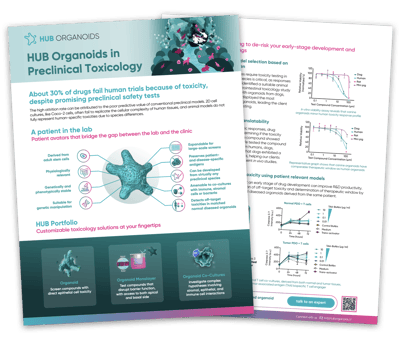INFOSHEET
HUB Organoids in Preclinical Toxicology
Transforming Preclinical Toxicology Using Patient-derived Organoids

Did you know that about 30% of drugs fail in human trials due to toxicity, even after promising results from preclinical safety tests? This high attrition rate is primarily due to the limited predictive value of conventional preclinical toxicology models. Standard 2D cell cultures, such as Caco-2 cells, often struggle to replicate the cellular complexity of human tissues. Furthermore, animal models can overlook critical human-specific toxicities due to significant species differences.
Why Choose HUB Organoids for Preclinical Toxicology?
HUB Organoids, derived from patient tissues, offer a reliable and accurate platform for evaluating drug toxicity in preclinical toxicology. Our advanced culture methods integrate immune cells and stromal components in a co-culture system, effectively simulating the intricate microenvironment found in human tissues.
What You Will Learn by Downloading Our Infosheet:
-
Advantages of HUB Organoids in Exploratory Toxicology: Discover why HUB Organoids are the optimal choice for preclinical exploratory toxicology studies.
-
Explore Our Comprehensive Toxicology Portfolio: Learn about our extensive toxicology offerings, including patient-derived organoid models, monolayer cultures, and co-culture systems designed for enhanced predictive accuracy.
-
Unlock the Power of Patient-Derived Organoids (PDOs): Understand how PDOs can be effectively applied throughout the exploratory toxicology process, including:
- Early evaluations of on-target and off-target toxicities.
- Informed species selection for subsequent toxicology studies.
- Late-stage investigations that translate animal data into human organoid responses.
-
Witness the Evidence: Access real-world data showcasing the effectiveness of human and animal-derived organoids in exploratory toxicology.
